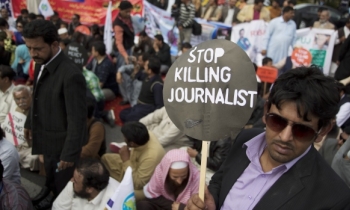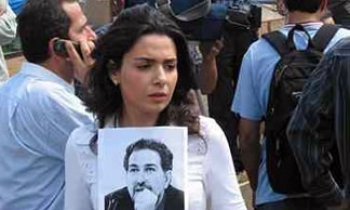Six months after the murder of ethnic Armenian journalist Hrant Dink, 18 suspects went on trial Monday in a case widely seen as a test of whether the country's judiciary will be able to investigate allegations of official negligence in the slaying, news reports said.
Dink was gunned down on January 19 and his killing led to international condemnation and debate within Turkey about free speech. Dink was hated by hardline nationalists for describing the mass killings of Armenians early in the last century as genocide.

The trial will take place behind closed doors because the alleged teenage gunman, Ogun Samast, is a minor. Critics have accused authorities of failing to act on reports of a plot to kill Dink, and it is unclear whether allegations that could potentially be embarrassing for top officials will be explored in the trial.
Hundreds of protesters demonstrated near the court house, appealing for justice and carrying a banner that read: "We are all witnesses, we want justice."
The lawyer representing the Dink family Friday last said the murder of the Turkish Armenian editor had not been thoroughly investigated and expressed fears over the independence of a court due to try the suspected killers. "The preliminary investigation has been limited to the place of planning (Trabzon)," Fethiye Cetin, lawyer for the Dink family, told a news conference.
"Hrant Dink's murder trial is a critical test of the Turkish judiciary's independence,” said Holly Cartner, Europe and Central Asia director at Human Rights Watch (HRW). “We will be closely watching how the court handles any evidence that may implicate the security forces."

"Turkish authorities must ensure that, in examining the case, no stone is left unturned. All those involved in the killing of Hrant Dink — those actively involved in planning and carrying out the fatal attack and those who failed to prevent it — must be brought to justice," said Andrew Gardner, Amnesty International's researcher on Turkey. "Hrant Dink's killing took place in the context of an increasing pattern of deadly intolerance of freedom of expression."
Turkey had vowed a thorough investigation, and the governor and police chief of the Black Sea city of Trabzon, the hometown of Samast, were removed from office because of negligence. Some security officials who posed for photographs with the gunman as he held a Turkish flag were also dismissed. There has been no evidence that directly implicates any police or government officials in the slaying of Dink outside his office.
Many Turks are convinced that a so-called "deep state" — a network of state agents or ex-officials, possibly with links to organised crime — periodically targets reformists and other perceived enemies in the name of nationalism.

Dink had been receiving death threats for several months prior to his death. He had reported these to the Sisli public prosecutor in Istanbul. Reportedly one of those on trial in connection with his death had also acted as a police informer and had repeatedly told police of the plan to assassinate Dink in the months leading up to his death. Nevertheless, the authorities failed to take the necessary steps to ensure protection for him, according to Amnesty.
Before the investigation into Dink's death started, the Istanbul Police Chief made a statement to the effect that the murder was not politically motivated or organised but rather the act of a lone gunman on the basis of nationalist sentiments. Amnesty International expressed concern that such a statement, coming so quickly after the incident, not only could have jeopardised the impartiality of the subsequent investigation but also illustrated an official reluctance to examine the full scope of the case.
"This trial will be a test of whether this quagmire will be dried up or not," lawyer Kezban Hatemi, representing Dink's family, told reporters before the hearing Monday. "The indictment lacks evidence and there is a need to find out real culprits."

Prosecutors failed to fully examine links with the scene of the murder in Istanbul and to investigate properly the criminal organisation believed to have plotted the killing, Cetain said. "To reach a sound verdict, it is necessary to secure the independence of the court, to ensure the functioning of the democratic system with all its rules and institutions and to prevent those with power having any influence over the trial," she said.
Dink sought to encourage reconciliation between Turkey and Armenia. He was prosecuted under Article 301 of Turkey's penal code, which bans insults to Turkish identity, for his comments on the mass killings of Armenians by Turks in the early 20th century.
In the 18 months prior to his murder, Hrant Dink had been the subject of three prosecutions for speech-related offences, according to HRW. For an article in which he discussed Armenian identity, Dink last July received a six-month suspended sentence under Article 301. Dink was prosecuted again in September under the same article for using the term “genocide” in a statement made to the Reuters news agency to describe the massacres of Armenians in Anatolia at the end of the Ottoman Empire.
Agos (Furrow), the bilingual Turkish and Armenian-language newspaper that Dink edited until his death, continues to be targeted on charges of speech-related offences. Arat Dink, Hrant Dink’s son and now editor of Agos, and Serkis Saropyan, owner of the newspaper, are still on trial for “insulting Turkishness” as the publishers of Hrant Dink’s remarks and for a petition organised by Agos titled, “A signature against Article 301.” Two Agos journalists, Aydın Engin and Karin Karakaşlı, are also on trial under the same article. In the aftermath of Hrant Dink’s murder, prosecutions under Article 301 continue.









